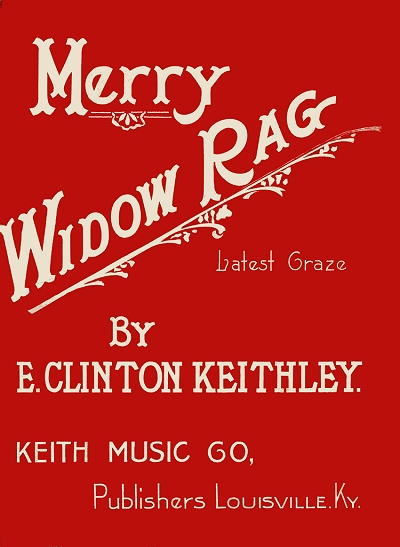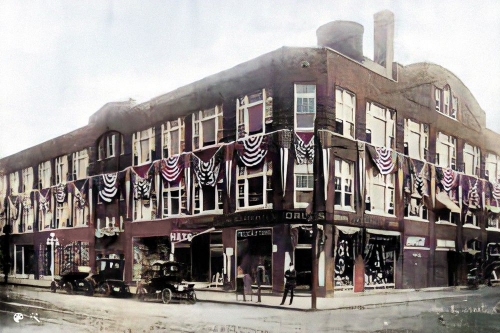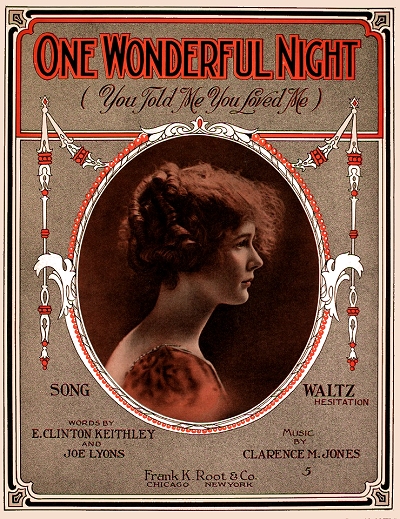Ernest Keithley was born in Greenville, Indiana, to state natives Robert Thurman Keithley and his bride Emma Bell Kay. He was the eldest of two boys, the other one being Kay Chester (1/1877). Robert was a country merchant, likely the owner of a mercantile in Greenville, which was a farming community for the most part. He got some requisite music training growing up, and likely private lessons, enough to make him a capable pianist at the very least. Robert died in the spring of 1895, leaving Emma and her sons to fend for themselves. The 1900 enumeration showed them still living in Greenville, with Ernest listed as a musician. However, by 1902, he and his mother relocated to Louisville, Kentucky, potentially so that he could attend the music conservatory there while teaching and performing at the same time (attendance was difficult to confirm). The 1902 and 1903 Louisville city directories show Ernest as a music teacher.
The combination of Ernest and Kentucky seemed to bode well, as he reflected on his environs in his first known published work from 1905, In the Valley Where the Old Ohio Flows, followed by My Old Kentucky Sweetheart. By this time, Louisville directories showed him to be a working musician, largely employed by McCauley's Theater as a pianist and cornetist, and the manager of his own small musical concern, which was located in the Starr Dry Goods Company [department store] as their music department. His obituary noted that he played in orchestras for around a decade in Louisville, pretty much his entire time in that city. Keithley's first rag of note was a syncopated take on the then-famous Merry Widow Waltz, which was from the operetta by Austro-Hungarian composer Franz Lehar. It was followed in 1909 by two piano rags, Bumble Bee and the moderate hit Dixie Kisses, and an intermezzo. As a composer, Ernest chose to self-publish his works under the name E. Clinton Keithley, issued by his own Keith Music Company.
His obituary noted that he played in orchestras for around a decade in Louisville, pretty much his entire time in that city. Keithley's first rag of note was a syncopated take on the then-famous Merry Widow Waltz, which was from the operetta by Austro-Hungarian composer Franz Lehar. It was followed in 1909 by two piano rags, Bumble Bee and the moderate hit Dixie Kisses, and an intermezzo. As a composer, Ernest chose to self-publish his works under the name E. Clinton Keithley, issued by his own Keith Music Company.
 His obituary noted that he played in orchestras for around a decade in Louisville, pretty much his entire time in that city. Keithley's first rag of note was a syncopated take on the then-famous Merry Widow Waltz, which was from the operetta by Austro-Hungarian composer Franz Lehar. It was followed in 1909 by two piano rags, Bumble Bee and the moderate hit Dixie Kisses, and an intermezzo. As a composer, Ernest chose to self-publish his works under the name E. Clinton Keithley, issued by his own Keith Music Company.
His obituary noted that he played in orchestras for around a decade in Louisville, pretty much his entire time in that city. Keithley's first rag of note was a syncopated take on the then-famous Merry Widow Waltz, which was from the operetta by Austro-Hungarian composer Franz Lehar. It was followed in 1909 by two piano rags, Bumble Bee and the moderate hit Dixie Kisses, and an intermezzo. As a composer, Ernest chose to self-publish his works under the name E. Clinton Keithley, issued by his own Keith Music Company.The 1910 census had Ernest living with his mother and an uncle, working as a musician McCauley's Theater in Louisville. It was difficult to find any output for him that year, but for a time Keithley teamed with fellow composer Al Marzian to form a publishing company based in Louisville. One of their first issuances was Marzian's own Aviation Rag, released under the pseudonym Mark Janza. Then Keithley started to come to life with a couple of entries in 1911, two rose-themed songs composed to poems by Charles Hamilton Musgrove, both issued by the Keithley and Marzian firm. One of those tunes, A Garland of Old Fashioned Roses, became a best seller when it was republished in Chicago, reportedly selling as many as five million copies during his lifetime. Keithley and Marzian went their separate ways by the end of the year. On August 8, 1911, Ernest married dentist office assistant Lalah Taylor across the river from Louisville in Indiana. In 1912 he increased his output just a bit, including another piece about roses. By late in the year, Keithley decided that Louisville was not the best possible area in which to utilize his musical skill set, so he moved to Chicago, Illinois.
Soon after arriving in Chicago, Ernest became acquainted with lyricists J. Will Callahan and Floyd Thompson, both of whom were known to publishers around town. This made it easier for works he composed to their words to find their way into print, and for Keithley to become a commodity. With these two men his output increased for 1913, and then even more in 1914. Several publishers were responsible for issuing his works, including Will Rossiter, Harold Rossiter and Frank K. Root. F.J.A. Foster even welcomed him to their professional department for a while. However, by late 1914 Ernest became established as a resident composer and arranger with McKinley Music, soon taking the role of professional manager, essentially finding writing talent to provide material and performing talent to play it to the public, even doing it himself quite often. His role was explained in this 1915 newspaper article:
E. Clinton Keithley, professional manager of the McKinley Music Company hails from that part of the South where composers get their melodies from the birds singing in the trees. Sordid city life does not disturb Keithley's dream of verdant fields and the dream is translated into the language of songs that reach the heart. While living in Louisville he was cornet soloist in the orchestra of Macauley's Theatre and later soloist with Natiallo's band, when the ambition to compose music suddenly seized him. He completed a few songs, published them and soon worked a niche for his compositions in the adamantine wall of the music counters. He went to Chicago … then William McKinley noticed him and induced him to take care of the McKinley professional interests, housed in the Grand Opera House building.
Since then he has had the opportunity to write the kind of songs he has always wanted to write. The McKinley catalogue has room for songs stolen from the songs of the birds. Keithley's writing record has been a remarkable one. Extremely prolific, he has also demonstrated versatility, for he has written all types of songs. As a professional manager he has proved zealous, untiring and ambitious. Possessed of a crystal clear voice and the ability to accompany himself upon the piano, he has permitted no opportunity to boost McKinley numbers to pass unnoticed. He has played engagements that required a great deal of time for the minimum returns (four shows a day) and takes particular pleasure in appearing on holidays when most professional managers are glad to remain away from their office. Keithley possesses the polished manners of a real Southern gentleman. An immaculate dresser, he presents a splendid appearance. Pre-eminently a ballad writer, the songs which have done most to bring his name into the limelight within recent months are, "I'll Return, Mother Darling, to You," "One Wonderful Night," "I Love the Name of Dixie," and "Alice of Old Vincennes." Keithley's knowledge of the market's popular requirements, united to his unswerving ambition, are bound to assert themselves in a long train of successful songs that will endear this hard working young composer to the hearts of music lovers where ever ballads are sung and loved."
 |
Keithley's musical activities went far beyond the McKinley building. He was popular on the local vaudeville stages, whether or not he was promoting his works or those of his company. Ernest was also a competent organist, sometimes playing for cinemas, but mostly just playing concerts and special appearances. His output in the mid-1910s, which had included ragtime numbers in the past, had softened to ballads, reveries, sentimental tunes, and the occasional rouser. Two of his most popular works appeared in 1916. My Rosary of Dreams was a brisk seller, but When Shadows Fall, issued as a reverie, a waltz, and song, became one of his best sellers, as evidenced by the number of copies that are still found a century later. His performance and management duties appeared to slow his published output from 1917 to 1919, although a few war-related numbers managed to get through the doors. Most of his tunes from late 1915 into the early 1920s were composed to lyrics by Harold G. "Jack" Frost, a popular Chicago writer who had worked with many local composers over the years, and was also employed by McKinley during that period. The team had a good run of postwar romantic numbers in 1920 as the jazz age took hold of America, but as their tunes fell a bit short of that popular trend, they sold fewer copies than jazz tunes, and especially records of jazz tunes. The 1920 enumeration listed Ernest as a "professor of music," performing in music halls, but unlikely to have been working as a music teacher. Several advertisements in The Billboard affirmed that he was still working for McKinley in the Grand Opera House Building in Chicago.
Ernest was also a competent organist, sometimes playing for cinemas, but mostly just playing concerts and special appearances. His output in the mid-1910s, which had included ragtime numbers in the past, had softened to ballads, reveries, sentimental tunes, and the occasional rouser. Two of his most popular works appeared in 1916. My Rosary of Dreams was a brisk seller, but When Shadows Fall, issued as a reverie, a waltz, and song, became one of his best sellers, as evidenced by the number of copies that are still found a century later. His performance and management duties appeared to slow his published output from 1917 to 1919, although a few war-related numbers managed to get through the doors. Most of his tunes from late 1915 into the early 1920s were composed to lyrics by Harold G. "Jack" Frost, a popular Chicago writer who had worked with many local composers over the years, and was also employed by McKinley during that period. The team had a good run of postwar romantic numbers in 1920 as the jazz age took hold of America, but as their tunes fell a bit short of that popular trend, they sold fewer copies than jazz tunes, and especially records of jazz tunes. The 1920 enumeration listed Ernest as a "professor of music," performing in music halls, but unlikely to have been working as a music teacher. Several advertisements in The Billboard affirmed that he was still working for McKinley in the Grand Opera House Building in Chicago.
 Ernest was also a competent organist, sometimes playing for cinemas, but mostly just playing concerts and special appearances. His output in the mid-1910s, which had included ragtime numbers in the past, had softened to ballads, reveries, sentimental tunes, and the occasional rouser. Two of his most popular works appeared in 1916. My Rosary of Dreams was a brisk seller, but When Shadows Fall, issued as a reverie, a waltz, and song, became one of his best sellers, as evidenced by the number of copies that are still found a century later. His performance and management duties appeared to slow his published output from 1917 to 1919, although a few war-related numbers managed to get through the doors. Most of his tunes from late 1915 into the early 1920s were composed to lyrics by Harold G. "Jack" Frost, a popular Chicago writer who had worked with many local composers over the years, and was also employed by McKinley during that period. The team had a good run of postwar romantic numbers in 1920 as the jazz age took hold of America, but as their tunes fell a bit short of that popular trend, they sold fewer copies than jazz tunes, and especially records of jazz tunes. The 1920 enumeration listed Ernest as a "professor of music," performing in music halls, but unlikely to have been working as a music teacher. Several advertisements in The Billboard affirmed that he was still working for McKinley in the Grand Opera House Building in Chicago.
Ernest was also a competent organist, sometimes playing for cinemas, but mostly just playing concerts and special appearances. His output in the mid-1910s, which had included ragtime numbers in the past, had softened to ballads, reveries, sentimental tunes, and the occasional rouser. Two of his most popular works appeared in 1916. My Rosary of Dreams was a brisk seller, but When Shadows Fall, issued as a reverie, a waltz, and song, became one of his best sellers, as evidenced by the number of copies that are still found a century later. His performance and management duties appeared to slow his published output from 1917 to 1919, although a few war-related numbers managed to get through the doors. Most of his tunes from late 1915 into the early 1920s were composed to lyrics by Harold G. "Jack" Frost, a popular Chicago writer who had worked with many local composers over the years, and was also employed by McKinley during that period. The team had a good run of postwar romantic numbers in 1920 as the jazz age took hold of America, but as their tunes fell a bit short of that popular trend, they sold fewer copies than jazz tunes, and especially records of jazz tunes. The 1920 enumeration listed Ernest as a "professor of music," performing in music halls, but unlikely to have been working as a music teacher. Several advertisements in The Billboard affirmed that he was still working for McKinley in the Grand Opera House Building in Chicago.From 1921 to 1923, Ernest wrote several moderate hits with F. Henri Klickmann, who had also been working for McKinley for many years as a composer and arranger. Keithley provided the lyrics for many of these pieces. When Klickmann moved to New York to work for Jack Mills Music their association ended. In the interim he had continued to make appearances on stage in Chicago and assorted venues in the upper Midwest. When radio started growing in popularity, Ernest was right there, bringing his piano and vocal skills to clear channel Chicago stations such as WCFL and WSWS, the latter which could be heard from Kansas City to New York most evenings. He became a fixture on Chicago radio from 1924 into the early 1930 as both a talent and a host, likely also a producer of some shows. The 1930 census showed Ernest, living in Chicago with his mother but without Lalah, working as a singer and composer in radio.
Unfortunately for many talents of the ragtime era, when the Great Depression deepened in the 1930s, tastes were shifting to newer music styles, and some of the old school composers and performer had trouble filling that demand. Keithley's compositional output had slowed after 1923, and many of his tunes were of the older ballad type, some of them considered perhaps a little corny or maudlin for contemporary tastes. Swing was taking over, and the voices on the radio were now leaning towards the crooning style, so there was virtually no mention of Keithley on the air after 1930. He did a little writing, and perhaps some arranging, but not much else is known about his depression era activities. He and Lalah were separated during this period. In the late 1930s, probably after Clinton's mother Emma died in 1938, he relocated to the west coast of Florida. In 1939 he was officially divorced from Lalah, and on March 8, 1940, he married recently-widowed Evelyn Pearl Walstrom in Tampa, Florida. They were shown in the 1940 census back in Chicago for a brief period, with several lodgers in his home. Still optimistic about his career and himself, he was listed as a songwriter with his own studio, and put his age as 53, a full decade of separation from the truth.
By the early 1940s Ernest and Evelyn were back in Tampa where he lived the remainder of his life. He wrote a few songs about World War II which failed to get much traction, although given that they were mostly to lyrics by Lillian D. Raftis, there is the possibility that they were commissioned. The same goes for a group of songs he wrote with Elsie Mae Borgen that were all copyrighted in 1953 when he was 76 years old. The 1950 census, taken in what were the fringes of Tampa, at that time showed Keithley with no occupation listed. E. Clinton Keithley died in the spring of 1955 at age 78, and was interred in Myrtle Hill Memorial Park in Tampa two spaces down from Eva's first husband Edward Walstrom. She was laid to rest between her two men in March of 1958. Keithley is largely remembered today for a handful of songs, with his name on the covers of sheet music featuring quality ragtime era artwork, but as a background talent there was much more to him in keeping the music of the 1910s and 1920s vital and in front of the public.
 Known Compositions
Known Compositions